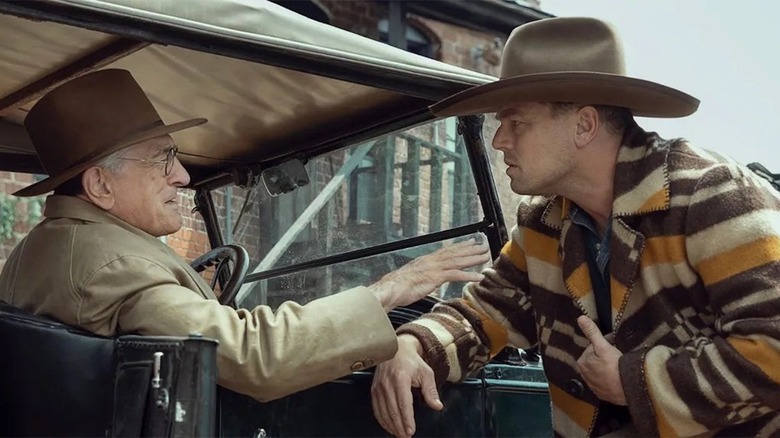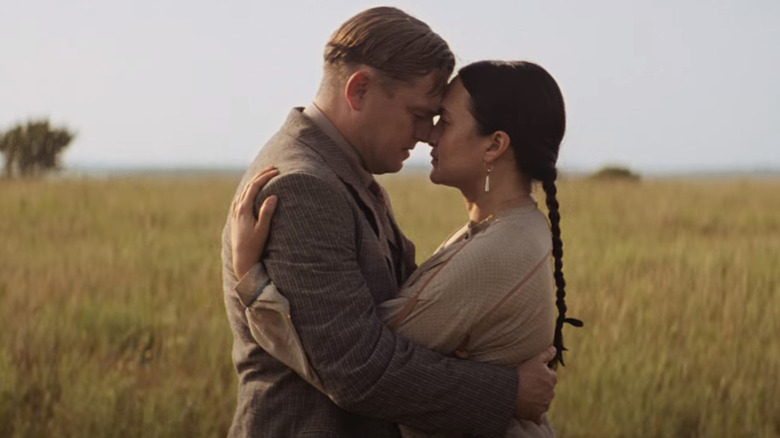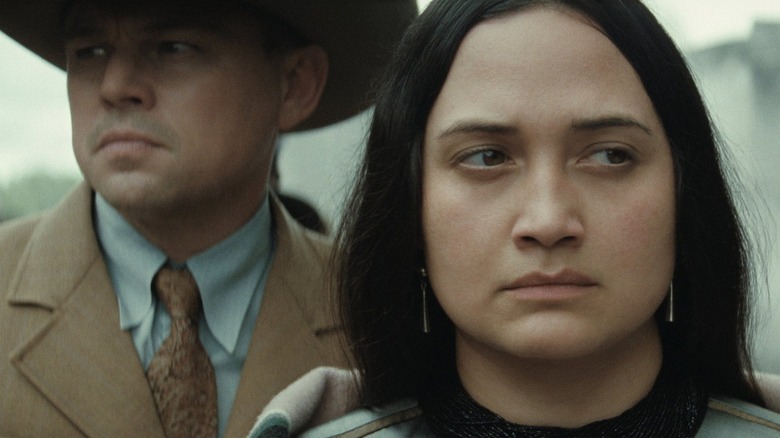A Simple Question From Leonardo DiCaprio Completely Changed Killers Of The Flower Moon
David Grann's "Killers of the Flower Moon: The Osage Murders and the Birth of the FBI" is one of the finest nonfiction books of the 21st century. His account of a vile criminal conspiracy wherein members of the Osage tribe, who'd been awarded highly lucrative headrights to the oil deposits discovered on their land, were murdered by white Oklahomans is as absorbing as it is infuriating. Grann does a masterful job of blending the story of the Osage with the procedural tale of the investigation by the United States' newly formed Bureau of Investigation (soon to be the FBI). It's never less than gripping, but, even with the conviction of William Hale, who orchestrated the murder of his nephew's Osage wife and many of her family members, you're left fuming at the abject evil of these predators.
Grann's story is primarily driven by Tom White, a former Texas Ranger who's joined the FBI to probe the multitude of murders in and around the Osage's land. White was a virtuous lawman. He couldn't be bought. He was the perfect man to investigate the conspiracy, but as a film protagonist, that kind of character gets boring really quick (which is why Brian De Palma's "The Untouchables" provides Kevin Costner's Eliot Ness with a colorful beat-cop mentor in Sean Connery's Malone).
For Martin Scorsese, whose big-screen adaptation of Grann's book just premiered to mostly raves at the 2023 Cannes Film Festival, White proved to be something of a narrative dead end. So when Leonardo DiCaprio, who was set to play White, suggested a different way into the story, Scorsese leapt at it.
Turning a procedural into a twisted love story
When Scorsese signed on to make "Killers of the Flower Moon," he envisioned DiCaprio as White because, well, he was the logical lead. Academy Award-winning screenwriter Eric Roth, who wrote one of the finest procedurals ever in "The Insider," set out to tell the tale of the White's meticulous take down of Hale.
But while the story was righteous in ways that are often showered with Oscars, something didn't sit right with DiCaprio. In an interview with Deadline, Scorsese recalled the moment the writing of the film took a completely unexpected turn. "Leo DiCaprio looked at me and said, 'Where's the heart in this movie?'" said the filmmaker. He immediately got it. Per Scorsese:
"Look, the minute the FBI comes in, and you see a character that would be played by Robert De Niro, Bill Hale, you know he's a bad guy. There's no mystery. So, what is it? A police procedural? Who cares! We've got fantastic ones on television."
Scorsese began researching, hoping to find some flaws in the man's character. There were none. The man was a boy scout. The director threw up his hands. "I finally said, 'What are we making? A film about Tom White, who comes in and saves everybody?'" (Jesse Plemons plays White in the final film.)
Scorsese then turned to the character of Ernest Burkhart, the enigmatic husband of Mollie Kyle, a full-blooded Osage who had a claim to considerable wealth. This would be DiCaprio's character, and it would transform the complexion of Scorsese's film.
A portrait of unthinkable betrayal
Ernest was William Hale's nephew, and he married Mollie at his nefarious uncle's urging. But the marriage wasn't strictly opportunistic. As Scorsese noted to Deadline, "The only person that has heart, besides Mollie Burkhart, is her husband Ernest, because they're in love."
This was backed up by Scorsese's meeting with the Osage at the Gray Horse settlement in Oklahoma. Upon learning that their romance was very real, the director realized he had a far more complex film on his hands. If Ernest truly loved Mollie, how could he follow his uncle's orders and try to poison her.
There wasn't much research on Ernest, which gave Scorsese and DiCaprio a tremendous amount of room to operate. They could perform their own, intimate investigation into an unthinkable betrayal. "If we did that," said Scorsese, "we'd take the script and turn it inside out, make it from the ground level out, rather than coming in from the outside. I said, 'Let's put ourselves in the mindset of the people who did this.'"
The early returns suggest that this approach was the right one, but we won't get to see for ourselves until "Killers of the Flower Moon" hits theaters on October 6, 2023. Judging from the trailer, you'll absolutely want to see this on the biggest screen possible.


